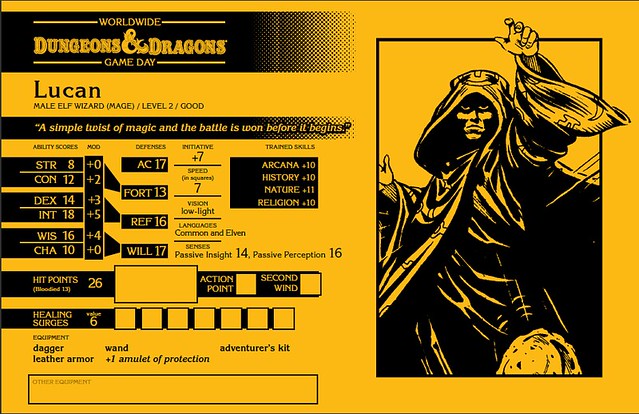In two weeks, I should be starting a new D&D campaign with a new gaming group. And when I say 'new', I mean it; only one of three players I've rounded up have any experience with D&D. To me, this presents an exciting opportunity to pass along my passion for d20-kickassery and introduce people to the sheer fun of the game.
As long as I don't screw it up, which I have before.
Missteps
A long, long time ago I played Magic: The Gathering with a decent amount of zeal. After moving to a new city without a prevalent card-playing scene at the time, I tried to teach my wife how to play. She had been very accommodating of my geeky tastes and wound up sharing quite a few of them, but Magic turned out to be an epic fail with her. She was having trouble grasping the often-tangled concepts I was throwing out, and stung from losing the first few games I tried playing with her. She often remarked, "I recognize all these words are English... but I still don't get what they're saying." After that disastrous process, Magic became a taboo subject and was pushed to the back of the closet with my other forgotten games.
Later I found a pair of very, very well-written articles about applying conventional teaching methods to people trying to learn Magic, and discovered that in my rush to get my wife to play cards with me I had made every wrong move possible. I had failed to see things from her standpoint, build decks specifically designed to not be overwhelming to a new player, to introduce new concepts like summoning sickness slowly and only move on after they'd seen them in action repeatedly, and above all... let her win.
Starting From Scratch
So I find myself again with people who don't know what AC means, the difference between a d8 and a d20, and why you should always bribe the DM with food. And this time, I'm trying to take a step back from my giddiness at being able to play D&D again to really look at the game from a newbie's perspective. That means introducing big concepts slowly, dialing down the complexity of things like combat and character creation for a few sessions, and trying to emphasize the most fun parts of the game without paralyzing them with too many choices.
In that vein, here are some questions I expect to be asked, and the answers I plan on giving:
- How do we play D&D?
"You take on the role of heroic adventurers in a fantasy world; as fighters, wizards, rogues and other characters, you seek out and fight monsters and villains to make the world a better place, or just so you can take their treasures. We use dice to decide random elements such as if you hit something with a sword, how much damage you do with a spell, or if you're able to disarm a trap. Your characters have unique powers and abilities that get better as you increase your level, and help you and your teammates take on bigger and bigger challenges."
- So we don't have to talk like we're at a ren fair?
"You can if you want to. It's a roleplaying game, so if you want to give your character their own voice you can, but you don't have to."
- What does all this stuff on the character sheet mean?
"They describe the different abilities your character has. Almost all of them come from two choices: your race and your class. The races include humans, elves, dwarves, and other fantastic creatures like dragonborn. The classes determine what your job is in combat, and how you adventure; fighters wear heavy armor and can draw many enemies to attack them instead of their friends, while clerics are priests and leaders that can heal their friends and give them bonuses in combat."
- There's a lot to figure out... what am I supposed to do during my turn?
"There's one rule that applies almost everywhere: roll a d20, and roll high. To attack something with a sword, you roll a d20, add your bonuses for melee combat, and compare that to the enemy's defenses. To pick a lock, you roll a d20, add your bonuses to lockpicking, and try to beat the lock's difficulty. Don't worry about what you add at first, I'll help you figure that out, and in time you'll get the hang of it."
- So is this all about killing monsters and taking their stuff? All I do is swing a sword or shoot a spell?
"If you want to do something different, there's nothing stopping you. Just ask the DM if you can do it, and they'll help you figure out how. For instance, you can try talking to a pack of nasty goblins that you ran into while exploring a dungeon instead of fighting them, or you can try kicking down a locked door instead of picking its lock. Use your imagination, and don't be afraid to make up something new!"







In my defense, what is didn't like about Magic was that it made me feel stupid - not that I didn't win. Every time I played I couldn't use strategy because it felt like the rules would change. No one wants to spend time feeling like an idiot. I did that when I worked at LaTech.
ReplyDelete